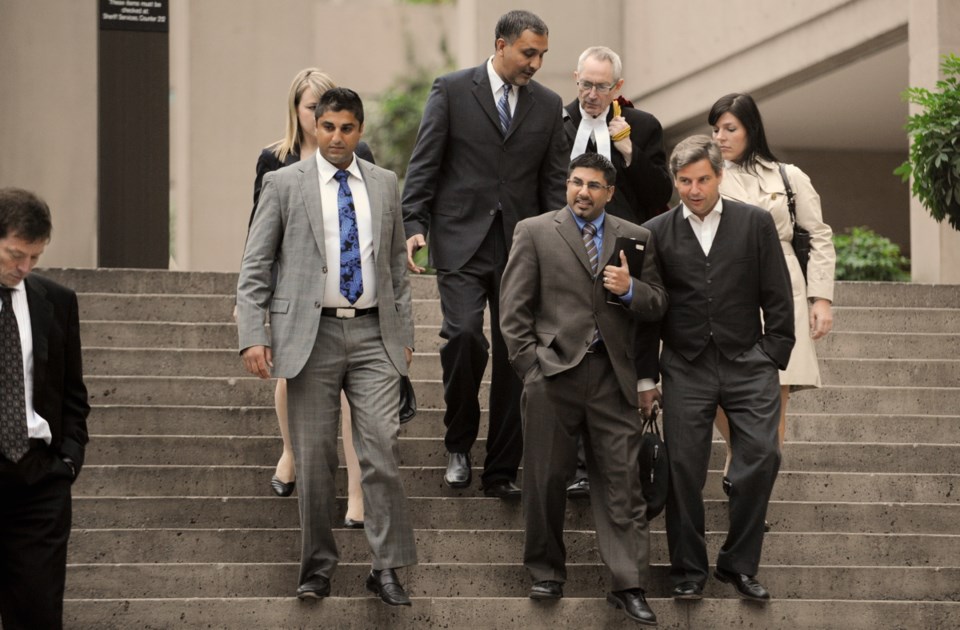VANCOUVER - Taxpayers in British Columbia may never fully learn why the government paid $6 million in legal fees for two former ministerial aides who pleaded guilty to corruption charges, after a judge dismissed an application for government documents.
B.C. Supreme Court Justice Robert Bauman said in his written decision Tuesday that auditor general John Doyle's request for documents involving Dave Basi and Bobby Virk amounted to a sweeping invasion of solicitor-client privilege.
Doyle told a hearing last September that as a public watchdog, he needed access to government information to determine whether public money was spent economically in connection to an indemnity policy for senior employees who are acquitted.
Under that policy the government has waived legal fees for 95 people since 1999, with the biggest payout going to Basi and Virk, although they pleaded guilty.
The pair were charged with fraud and breach of trust in connection with the $1-billion privatization sale of B.C. Rail to CN in 2003, which culminated in a police raid on the legislature in December that year amid allegations the men leaked government information to one of three bidders.
The case dragged on for seven years until it abruptly came to an end in October 2010, when Basi and Virk made surprise guilty pleas and the government announced their legal fees had been paid.
The move sparked public outrage, demands for a public inquiry by the Opposition New Democrats and eventually Doyle's court application.
"Solicitor-client privilege is not a lawyer's 'trick' to avoid proper scrutiny of her client's conduct or the steps taken on his or her behalf during the retainer, it is a critical civil right," the judge said.
"It would be wrong to conclude that the result in this case represents the triumph of secrecy over transparency and accountability," Bauman said, adding the principle of solicitor-client privilege has been a cornerstone of democracy for hundreds of years.
New Democrat Leonard Krog, the critic for the Attorney General's Ministry, said his party will pursue a public inquiry if it's elected in May because that's what British Columbians want.
"On the law, the judge may well be right," he said. "But from a public interest perspective, people clearly wanted the auditor general to succeed," he said.
"The $6 million that the Liberal government wrote off in legal fees upset British Columbians and it was salt in the wound of B.C. Rail. The decision now means that it will be harder for the auditor general to give the fulsome report that he had hoped to create as a result of his investigation into this."
Doyle was not available for comment, but Krog said the auditor general may be able to obtain other documents related to Basi and Virk's case, although the scope of his investigation will be limited.
The government's indemnity policy also applied to former NDP premier Glen Clark, who was acquitted in August 2002 of breach of trust charges in a casino licensing scandal and had his legal fees paid.
In November 2011, an independent government-commissioned report by University of British Columbia president Stephen Toope said the province should pursue costs after a guilty plea or verdict.
Toope said that while the government is obligated to pay costs for employees who are considered innocent, that shouldn't be the case otherwise.
Attorney General Shirley Bond said at the time that the government will adopt the nine recommendations in Toope's report, including proceeding with plans to go after assets to recover court costs when the province shells out money for legal costs.
Krog noted Basi had property worth about $300,000 and that it was secured by the government, which chose not to get back any of the legal fees.
John van Dongen, who left the Liberals to join the Conservative party and now sits as an independent MLA, was granted intervener status at the hearing launched by Doyle.
Van Dongen said Doyle may still be able to provide some answers.
"He has the legal authority and the opportunity to still do a credible report around the issues that are of the greatest importance with this sudden and unexpected plea bargain and writeoff of $6 million in legal fees, contrary to government policy," he said.
Basi and Virk were each sentenced to two years less a day of house arrest and 150 hours of community service.
Money-laundering charges against a third person, Aneal Basi, a former government communications worker and Dave Basi's cousin, were dropped.



